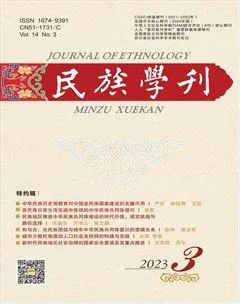From Little Tradition to Great Tradition:The Influence of the Gaitu Guiliu Policy on Social Life in Southwestern Hubei
Huang Boquan, Fanyang Wencan
DOI:10.3969/j.issn.1674-9391.2023.3.013
Abstract:
Relevant research suggests that before implementing the Gaitu Guiliu policy (i.e. replacement of native officials with royally appointed officials), social life in Southwestern Hubei had already formed unique local characteristics. They were reflected in its eating habits, banquet etiquette and customs, living habits, marriage rituals, basic social organizations, communication with the central dynasty, beliefs and traditions, and form and content of education. For instance, in the form of marriage, the uncle (mothers brother) had a greater right in deciding the marriage of his nephew; in the belief tradition, people generally believed in “witches and ghosts”; in terms of education, Confucian education tended to be aristocratic, i.e. the Central Dynasty required that the premise for the succession of Tusi position was to get Confucian education.
After the implementation of the Gaitu Guiliu policy in Southwestern Hubei during the Yongzheng period of the Qing dynasty, the central government carried out a series of measures to improve social life, such as updating the concept of agricultural production, standardizing marriage etiquette, advocating ancestor worship, prohibiting folk witchcraft, and popularizing Confucian education. These measures promoted a dependency of rural livelihood on farming, an increase of social exchange, ritualization of social life, integration of seasonal festivals, and diversification of sacrificial rites in Southwestern Hubei. The hunting-farming livelihood model shifted to one depending mainly on farming; there were more forms of folk communication, and the scope of exchanges had expanded; local society had generally formed a cultural consciousness centered on Confucian morality, life etiquette tended to be standardized, ethics of filial piety was deeply rooted among the people, and the clan concept embedded in social governance; nationwide seasonal festivals became popular; folk beliefs became more diverse and sacrificial ceremonies had also changed. It could be said that after the implementation of the Gaitu Guiliu policy, the cultural atmosphere of the southwestern area of Hubei had changed significantly and had harmonized nearly completely with the inland parts of China.
Explaining the process of the changes mentioned above from the perspective of cultural stratification theory, it could be regarded as a process of interaction between the “great tradition” of the Central Dynasty and the “little tradition” of the southwestern part of Hubei, showing a dynamic interchange at different cultural levels, and reflecting the goal of “the great unity” concept of the dynastic state. The great tradition appeared to gradually transition into a set of more universal values: Indeed the two cultures interacted and complemented each other. The great tradition steered the overall cultural direction, while the small one provided real cultural practices. Being the mainstream culture of society on the premise of preserving the little traditions in the southern area of Hubei with which it had common values, the great tradition divided the small traditions into two parts: One was part of social life of folk society, and continued to play its roles; the another part was strictly constrained or even forbidden, transforming it into a little and underground tradition, preventing it from being passed on, turning it into a “dead culture”,ineffective and eventually dried up. Data also showed that for the southwestern area of Hubei, this historical process promoted the change of the overall outlook of social life in the region, greatly promoting a comprehensive integration of regional society into a broader historical process.
Key Words:
social life;the southwestern area of Hubei;great tradition;little tradition;the Gaitu Guiliu policy
- 民族学刊的其它文章
- 中华民族历史观教育对中国多民族国家建设的关键作用
- On the Building and Practice of a Social Support Network for the Urban Ethnic Minority Floating Population: A Case Study of “Ethnic Homes” in Guangzhou
- The Early Practice and Cultural Construction of Visual Ethnodanceology
- Core Issues in the Philological Study of Ethnic Literary Integration History in Ancient Southwest China
- A Study on the Formation Mechanism and Evolution Trend of Red Revolutionary Tourism Symbiosis Atlas in Sichuan Province
- A Development Model for the Homestay Industry in Qiang Areas Against the Background of Rural Revitalization:Based on a Survey in Wenchuan County, Aba Prefecture

